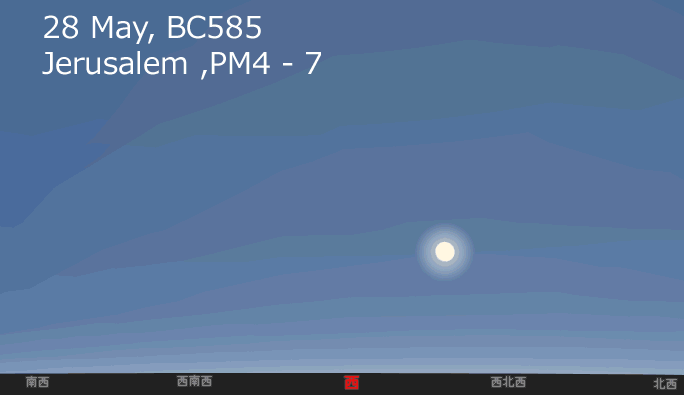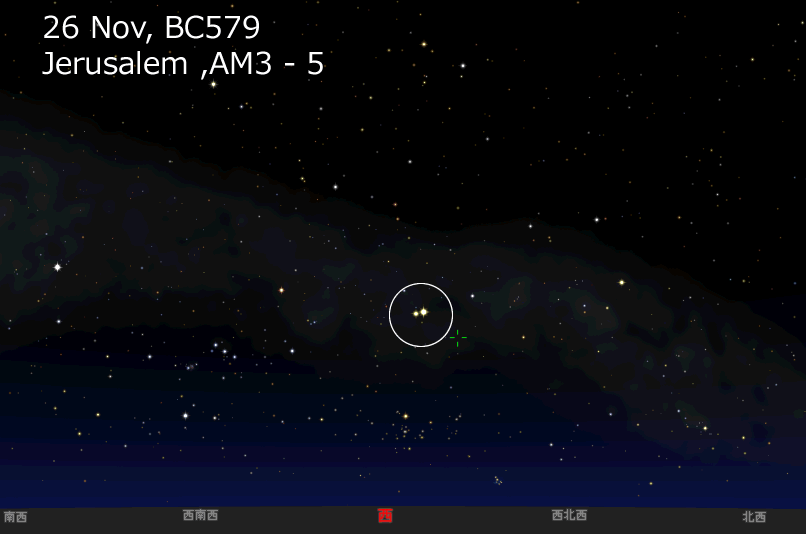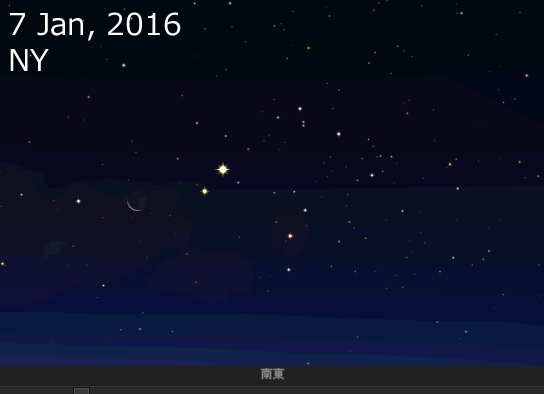イザヤ書14:12ヘレル・ベン・サハルはユリウス歴BC585年5月28日の三日月似の落ちる日蝕かも
新バビロニア最後の王ナボニドゥスが夢見たShahar=月の神Il-Teriは、白昼夢ではなかったかもしれません。

輝かせる夜明けの息子(イザヤ書14章12節のルシファーは悪魔ではない
イザヤ書14:12の謎は諸説あるようです。
聖書各箇所での明けの明星(the morning star)の比較
できるだけ原典に近い言語で聖書各箇所の「明けの明星(イザヤ書はギリシャ語ἑωσφόρος)」記述を比較すると、元々は別の表現であることが解ります。
- イザヤ書14:12のヘブライ語は「照らす夜明けの息子」
- イザヤ書14:12のギリシャ語翻訳は (εωσφόρος)明けの明星の神
- ペテロの第二の手紙1:19は (φωσφόρος)「輝かせるものがあなたの心に昇るまで」
- ヨハネ黙示録2:28は (ἀστέρα)「朝の星(複数)」
- ヨハネ黙示録22:16は(ἀστὴρ)「輝く朝の星(単数) 」
- マタイによる福音書 2:2に出てくるベツレヘムの星は (ἀστέρα)、「西方の星(複数)」
イザヤ書14:12のヘブライ語 - 照らす夜明けの息子(ヘレル・ベン・サハル)
黎明の子、明けの明星よ、あなたは天から落ちてしまった。もろもろの国を倒した者よ、あなたは切られて地に倒れてしまった
אֵיךְ נָפַלְתָּ מִשָּׁמַיִם, הֵילֵל בֶּן-שָׁחַר; נִגְדַּעְתָּ לָאָרֶץ, חוֹלֵשׁ עַל-גּוֹיִם
אֵיךְ どうやって נָפַלְתָּ あなたは落ちた
מִשָּׁמַיִם 天から הֵילֵל 輝かす、照らす(へれる) בֶּן- 息子(ベン) שָׁחַר 夜明け、曙(シャはル) נִגְדַּעְתָּ あなたは切り落とされた לָאָרֶץ 地に חוֹלֵשׁ 討ち滅ぼした者よ עַל- ~を גּוֹיִם 諸民族を 117頁 イザヤ書Ⅰ ヘブライ語聖書対訳シリーズ20 ミルトス・ヘブライ文化研究所編 2002年
イザヤ書14:12のギリシャ語 - 明けの明星の神εωσφόρος
Codex Sinaiticusπωϲ εξεπεϲεν εκ του ουρανου ο εωϲ φοροϲ ο πρωϊ ανα τελλων ˙ ϲυνετρι βη ειϲ την γην · α ποϲτελλων ειϲ
Greek Texts: πως (O how) εξέπεσεν (fell) εκ (from out of) του (the) ουρανού (heaven) ο (the) εωσφόρος (morning star) ο (the one) πρωϊ (by morning) ανατέλλων (rising) συνετρίβης (was broken) εις (unto) την (the) γην (earth) ο (the one) αποστέλλων (sending) προς (to) πάντα (all) τα (the) έθνη (nations)
εωσφόρος :暁・夜明けの女神エーオースの息子・明けの明星の神のヘオースポロス(別名ポースポロス Φωσφόρος :輝かせる者(リン(鉱物)))
ペテロの第二の手紙1:19 - 輝かせるものφωσφόρος
こうして、わたしたちには、預言の言葉はいっそう確かなものとなっています。夜が明け、明けの明星があなたがたの心の中に昇るときまで、暗い所に輝くともし火として、どうかこの預言の言葉に留意していてください。
2 Peter 1:19 (King James Bible) We have also a more sure word of prophecy; whereunto ye do well that ye take heed, as unto a light that shineth in a dark place, until the day dawn, and the day star arise in your hearts:
2 Peter 1:19, Tischendorf 8th Editionκαί ἔχω βέβαιος ὁ προφητικός λόγος ὅς καλῶς ποιέω προσέχω ὡς λύχνος φαίνω ἐν αὐχμηρός τόπος ἕως ὅς ἡμέρα διαυγάζω καί φωσφόρος ἀνατέλλω ἐν ὁ καρδία ὑμεῖς
ヨハネ黙示録2:28 - 星(複数)ἀστέρα
同じように、わたしも父からその権威を受けたのである。勝利を得る者に、わたしも明けの明星を与える。
King James Bible: And I will give him the morning star.
Westcott and Hort 1881:ὡς κἀγὼ εἴληφα παρὰ τοῦ πατρός μου, καὶ δώσω αὐτῷ τὸν ἀστέρα τὸν πρωινόν. 複数の星?
Codex Sinaiticus:ται ωϲ καγω ειλη φα παρα του πατροϲ μου και δωϲω αυ τω τον αϲτερα το 複数の星?
ヨハネ黙示録 22:16 - 星(単数)ἀστὴρ
わたし、イエスは使いを遣わし、諸教会のために以上のことをあなたがたに証しした。わたしは、ダビデのひこばえ、その一族、輝く明けの明星である。
I Jesus have sent mine angel to testify unto you these things in the churches. I am the root and the offspring of David, and the bright and morning star.
Westcott and Hort 1881: Ἐγὼ Ἰησοῦς ἔπεμψα τὸν ἄγγελόν μου μαρτυρῆσαι ὑμῖν ταῦτα ἐπὶ ταῖς ἐκκλησίαις. ἐγώ εἰμι ἡ ῥίζα καὶ τὸ γένος Δαυείδ, ὁ ἀστὴρ (star) ὁ λαμπρός (bright) , ὁ πρωινός (morning).
ベツレヘムの星は複数形の星
「ユダヤ人の王としてお生まれになった方はどこにおられますか。わたしたちは東方でその方の星を見たので,その方を拝むために来たのです」。 マタイによる福音書 2
λέγοντες, ποῦ ἐστιν ὁ τεχθεὶς βασιλεὺς τῶν Ἰουδαίων; εἴδομεν γὰρ αὐτοῦ τὸν ἀστέρα ἐν τῇ ἀνατολῇ καὶ ἤλθομεν προσκυνῆσαι αὐτῷ.
Matthew 2:2
ベツレヘムの星は木星と土星のグレートコンジャンクションではないかと言われています。ギリシャ語で単数の星と2つの星を表す単語が異なるところから気がつかれたそうです。
In chapter six, Kritzinger presents the text of Matthew 2 with his commentary. He notes a first difficulty in the Greek text of Matt 2:2 associated with the phrase αὐτοῦ τὸν ἀστέρα (※τὸν ἀστέρα the star), because ἀστήρ means star and not group of two stars. According to him, this difficulty may be resolved by realizing that the meaning of the Greek words ἀστήρ (star) and ἀστρὸν (stellar constellation) partly overlap, as in the German stern und Gestirn. He then points to a strong argument in favor of interpreting the star as the conjunction of Jupiter and Saturn when in Matt 2:10 the magi express their joy at seeing the conjunction again (for the third time ), which confirms that it is indeed a Great or Triple Conjunction.
pp.146 Peter Barthel,George van Kooten, The Star of Bethlehem and the Magi: Interdisciplinary Perspectives from Experts on the Ancient Near East, the Greco-roman World, and Modern Astronomy
ヘレル・ベン・シャヘルのシャハルとは?
イザヤ書14:12の明けの明星はラテン語では輝くものと翻訳され、ウガリト神話でヘレル・ベン・シャヘルのShaharは夜明けと朝の神を、Shalimは黄昏と夕を意味するそうです。Shahar神が金星の神Athtarを伴うテキストもあることから、明けの明星をイメージされたのかもしれません。しかしアシュタルは自らが小さすぎることに気がついて玉座から降りているので、傲慢な国への怒りとはまた別な物語のようにも思えます。バアル神の死と再生はバアルの偽装死による死の神モートの厄災回避と「妹力」による再生の物語でもあります。
また、「輝かせる夜明けの息子」が明けの明星とすると、頻繁に観察されるそれでなぜ地に落ちる国を表現したのかがよくわかりません。また、昇り行き空に消える明けの明星が"地に落ちる"と表現されるのは不可思議でもあります。
A FAILED ASSAULT ON HEAVEN (ISA 14:12-15)
The prophet Isaiah uses mythological language in a proverb mocking the king of Babylon (Isa 14:4,22) His references to the morning star, the ascent into the heavens, the mount of assembly, and to the realm of the dead (or the pit) would all have been familiar to his readers from the myths of the ancient Near East.
The name "morning star," or "Lucifer" in other translations (Isa 14:12), is a Latin translation of the Hebrew word helel, meaning "shining one." The morning star refers to the Day Star, Venus, and the prophet further identifies this morning star as "son of the dawn" (14:12).
Similar language appears with the Ugaritic deities Shahar and Shalim. Shahar was the god of dawn or morning; Shalim the god of dusk or evening. In another Ugaritic text, Shahar (morning) appears together with Athtar, the star deity who is also identified with Venus. So the ancient myths possibly had made Isaliah's readers familiar with the morning star whose father was the god of morning.
Isaiah's taunt of the morning star for wanting to ascend into heaven (14:13) may reflect the Ugaritic myth of Athtar, the Venus star deity. Athtar attempts to ascend to the throne of Baal, but is not able and is forced to return to his own, lower position in the pantheon. Athtar was not storming heaven, only sitting on the vacated throne of Baal. He excuses himself from the position upon realizing that he is too small. Nevertheless, a morning star ascending to heaven was known in Canaanite myth.
In Isaiah's proverb, the morning star desires to sit on "the mount of assembly" located "on the utmost heights of Mount Zaphon" (14:13). Similarly, Canaanite myths spoke of the mountain home of Baal on Saphon, and also of a mount of assembly.
In Isaiah's proverb, the morning star fails to ascend to heaven and is brought down to the realm of the dead, the netherworld also called the pit (14:15). Similarly in ancient Near Eastern mythology gods could die and be sent to Mot's netherworld. The reason that Baal's throne was vacant in the Ugaritic myth was that Mot had vanquished Baal and taken him to the realm of the dead.
pp.875 NIV, Chronological Study Bible, Hardcover, Multicolor, Full Color, Thomas Nelson
"Shalem (presumably the divine power symbolized by Venus as the Evening Star) occurs as a deity (Šlm/Salim) in the texts from Ugarit … The brief Ugaritic mythological text KTU 1.23, known as 'The Gracious and Beautiful Gods', is the most important source concerning the god Shalem."p.755, Dictionary of Deities and Demons in the Bible: Second Extensively Revised Edition
ユリウス暦BC585年5月28日の日蝕またはユリウス暦BC579年11月26日のグレイト・コンジャンクション
新バビロニア最後の王ナボニドゥスは、ウガリトのShaharを月の神Il-Teriと夢見たそうです。それがユリウス暦BC585年5月28日の日蝕なら、太陽と月のランデブーなので三日月にそっくりの日蝕は白昼夢とはいえず、本当だったかもしれません。その前年紀元前586年、ユダ王国は滅亡し、バビロン捕囚がはじまります。歴史上極めて重要な稀な事態を詩作にて表現するのには、明けの明星の様な日々観察できて、かつ、上昇して消えゆくものではフィットしないように思えます。
もしかするとイザヤ書14:12「黎明の子、明けの明星よ、あなたは天から落ちてしまった。もろもろの国を倒した者よ、あなたは切られて地に倒れてしまった」
の部分だけは、新バビロニアに滅びされた故国ユダ王国への哀悼だったのかもしれません。
BC585年5月28日の日蝕

The god Sahar (written II-teri) was the West Semitic form of the moon-god worshiped in northern Syria,
where theophoric names honoring him are common.
Nabonidus the Mad King: A Reconsideration of His Stelas from Harran and Babylon
, Paul-Alain Beaulieu
輝かせる夜明けの息子とは、天体が放つ光の総称のようなものではないでしょうか。
この日蝕でリディア王国とメディア王国のハリュス川の戦いは停戦しますが、この時仲介したのがナボニドゥスという記述もネット上ではみられました。だとすると、新興勢力であったスサのアケメネス朝の勃興を押さえられなかったので、新バビロニアを滅ぼした点では失敗だったとも言えます。しかしキュロス2世は残酷な支配者ではなかったとの記載もあります。「諸民族を討ち滅ぼした者」というイザヤ書の表現は、アッシリア~4王国分裂時代~アケメネス朝ペルシャの歴史の流れでは、それぞれの国に当てはまるようにも思います。
また、ユリウス暦BC579年11月26日は木星と土星のグレイト・コンジャンクションもみられます。これも重要な天体イベントだと思います。夜明けの女神エーオースの息子パエトーンは、木星と土星をあらわすと言われています。
中世の伝統にしたがえば、ユダヤ人の宗教は木星と土星の合に、イスラム教は♃☌♀(木星と金星の合)に、キリスト教は♃☌☿(木星と水星の合)に、反キリストは♃☌☾(木星と月の合)にそれぞれの起源を持っているという。♄(土星)とは逆に♃(木星)は善をほどこす星である。ペルシアの考え方によると木星は生を、土星は死を意味している。したがって♃-♄(木星と土星)という合は、両極端の合一を意味する。紀元前七年にこの有名な合が三回以上も双魚宮の中で起こった。いちばん大きな接近が生じたのは、紀元前七年五月二十九日のことで、しかも角相はわずか0.二一度であって、これはすなわち満月の半分の幅にも足りない。この合は接ぎ目のまん中、つまり双魚宮の線の湾曲の近くで起こった。
Carl Gustav Jung. (1951). Aion Psychologische Abhandlungen, Bd. , Rascher Verlag, Zürich. 94頁 C・G・ユング 野田倬(訳) 1990年 アイオーン 人文書院
木星と土星BC579年11月26日

イザヤ書には平和に過ごす民の暮らしの描写もあります。神に迫るような栄光よりも平和が一番ということかもしれません。
以上、David BowieのBlackstarにちなんで色々と調べてみました。王ナボニドゥスのShahar神が月の神Il-Teriなら、2016年1月7日は錬金術の黒い太陽、土星(ボウイ)と金星(アフロディーテであるイマンさんとレクシーさん)と月の神II-teriであるテリーさんのランデブーだったのかもしれません。京都もイスラエルもイスラムも愛したボウイさんの夜空です。
金星、土星、月

金星、土星

@e11ie_b_g00de5 pic.twitter.com/jasLgqMoDQ
— 虻! (@hurricane1281) 2016年3月12日









